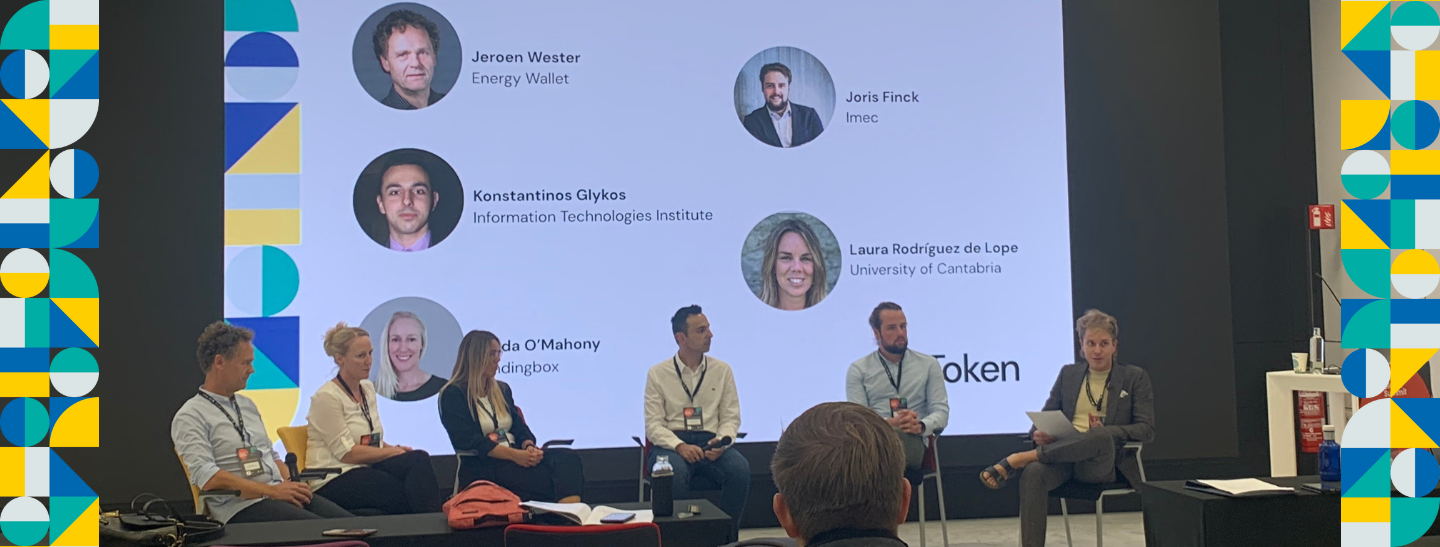Operational Learnings, Policy Recommendations and Scaling Potential
On 14 September 2022, in the framework of the FIWARE Global Summit, the Observatory 4th TOKEN Policy Observatory meeting. It certainly represented a means to get acquainted with the latest Distributed Ledger Technology (DLT) applications in the European public sector.
The 4th TOKEN Policy Observatory meeting held during the FIWARESummit22 gathered professionals working with applications of Distributed Ledger Technologies (DLTs) in the public sector to discuss operative learnings, the policy landscape and scaling potential related to current TOKEN Project Pioneer Use Cases.
In addition to presenting the four TOKEN Pioneer Use Cases and the first lessons learned so far along the implementation, attendees could learn all about scaling from an expert from a scaled Case, the Energy Wallet. The session was closed with a panel discussion moderated by the think tank Demos Helsinki.
The TOKEN Platform and the adoption of Pioneer Use Cases
One of the main content blocks of the event was focused on the experimental ecosystem that simplifies the implementation of Blockchain and Decentralised technologies within Public Services, via highly replicable Use Cases addressing:
- DLT for Smart Cities: Better exploitation of data in a Smart City context through a better knowledge of the usage of the data.
- DLT for Grant Distribution: Developing a new system for public funding distribution applying DLT to reduce costs and time for both parties.
- DLT for Public Procurement: for the reconciliation of financial data collected from the different units of public expenditure at the whole municipality level.
- DLT for Last mile logistics: to promote sustainable last-mile deliveries and local economy in the city of Leuven.
Lynda O’Mahony from FundingBox presented their TOKEN Use Case concentrating on Public Funding Distribution and reported that the “Users from the first pilot provided positive feedback and no reported issues. Over 80% found it easy to use so on the right track with user experience.”
Konstantinos Glykos from Information Technologies Institute talked about the Transparent Management of Public Accounts describing how they were creating a transparent system for procurements and a blockchain-based e-voting system for the participation of citizens in public spending.
Joris Finck from Imec gave insights to the Use Case on Last Mile Logistics & Dynamic City Access Management and explained how they were able to eliminate 6 out of 8 steps in the process and diminish traffic in the city center.
Laura Rodríguez de Lope from the University of Cantabria introduced their work on Data Valorization Services and showed how it could foster new business models based on data economy.
The Energy Wallet case
After the PUCs’ presentations we learned about scaling from Jeroen Wester, an expert from a scaled Case: the Energy Wallet. He highlighted three important things to consider when scaling up a public sector blockchain application:
- Helping users
- Privacy
- Not talking too much about technology
In deploying blockchain technology, an emphasis on privacy is key, as the nature of an immutable technology makes it difficult to process data in line with GDPR. Talking about DLTs in the public sector shouldn’t be too technical. Instead of talking about the technology, it is worth focusing on how the application itself will impact citizens’ lives. It’s also important to take time to ensure that there is sufficient help available when deploying the application. Paying attention to communications is vital.
An insightful discussion panel
Lynda O’Mahony shared that users were easier to find when they had a real incentive, as in their PUC’s case where they actually applied for funding through the system and could get money.
Technology can be distant to many: the panelists agreed that people don’t always have the knowledge to talk about technological aspects. Therefore there should be training and the discussions should also be steered away from the technology itself.
The GDPR and data protection was something the panelists brought up several times as a factor that can be challenging. Involving legal experts in the planning from the beginning can help finding the best solutions and making sure the GDPR is taken into account properly.
Key takeaways of the session
- Talking about technology can be scary. Concentrating on technological aspects can exclude people that are not experts in the technology theme from discussions and make the development seem distant to citizens. Instead of talking about blockchain itself we should discuss how it can help the community and people, and the business drivers. This makes the subject more understandable, appealing and inclusive.
- Remember to take into account the GDPR and immutability aspects. DLT’s are special because of their immutability, but it also creates challenges in reconciling the technologies with legislation. If you want to read more about how GDPR and blockchain go together check out this blog post.
- Have open discussions – it helps with promoting inclusion and helps develop the blockchain solution for the next iteration. Celebrating different skills and being open to developing the technologies helps with creating something really helpful to the society.
The Demos Helsinki team is currently working on a Briefing Paper based on the work done in the Policy Observatory – stay tuned for the upcoming publication!
Become one of the early adopters of TOKEN
Do you want to be one of the early adopters in any of these areas and deploy DLT in public service? CTOs, developers, blockchain and DLT enthusiasts, policy-makers, and public service agents are invited to explore what is for them in the TOKEN platform.
Request a demo with the TOKEN experts, to either discover the resources and solutions available in the Token Platform, or to explore any of the highly replicable Use Cases for specific areas of services.

